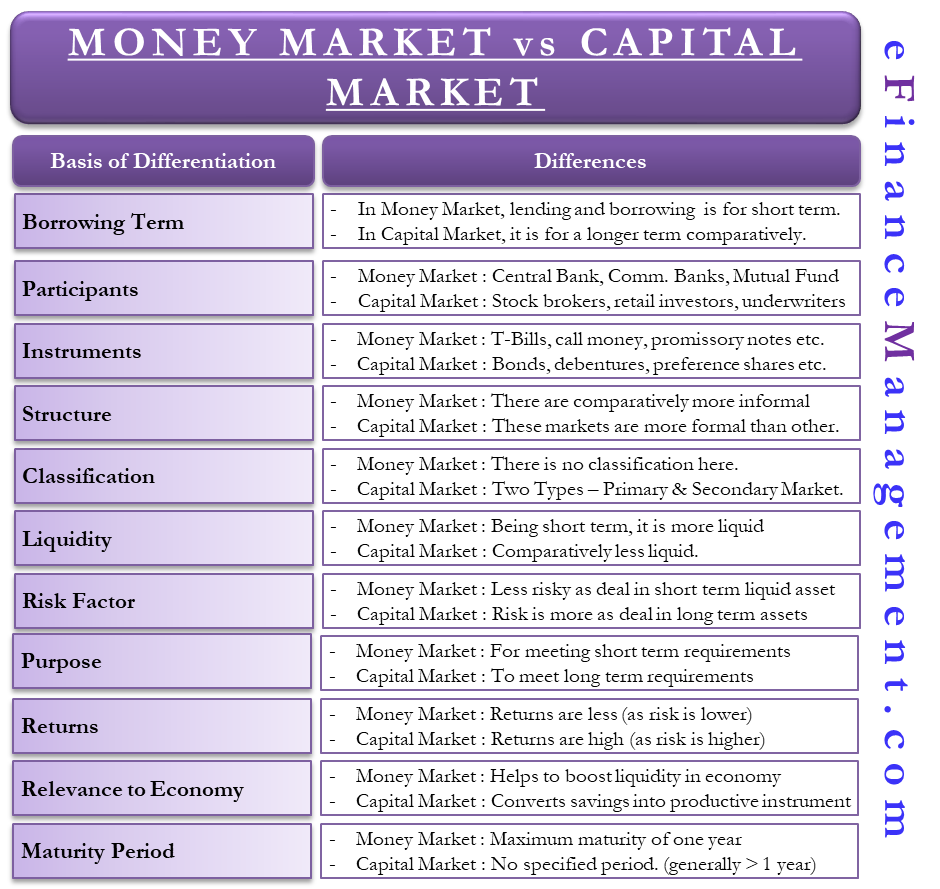Financial markets are a primary factor determining the success of any country. The main objective of the financial market is to ensure the availability of funds and help investors generate returns. Above all, financial markets help stabilize the money supply by ensuring surplus funds in the economy reach those who need them. There are two main types of financial markets – The money market and the Capital market. To understand how each of these financial markets functions and contributes to the economy, it is even more important to know the differences between the money market vs capital market.
Money Market
The money market is typically the marketplace where short-term lenders and borrowers meet and fulfill their fund and interest requirements. The payback period in the money market is somewhere between overnight and one year. Companies, financial institutions, and government agencies usually take this route to meet their short-term funds requirements.
Following are the features of the money market:
- Transaction volume in the money market is usually large since it is a wholesale market.
- Various organizations and entities such as banks, mutual funds, and so on benefit from the money market and are active participants.
- The money market is all about professional terms and pure competition. The borrower here looks for liquid funds, while the lender is looking for a quick return.
Following are the popular money market instruments – Certificate of Deposit (CD), Commercial papers, Swaps, Government Treasury certificate, Repo, Backup line of Credit, Credit Enhancements, Bankers’ Acceptance, Repurchase Agreements, and more.
Capital Market
It is a marketplace where both buyers and sellers come together to buy, sell and trade long-term financial securities such as bonds, stocks, etc. Both institutional and individual investors participate in the capital market.
Capital Market has two main divisions – Primary market and Secondary market. As the name suggests, the primary market is the place where companies issue new securities. At the same time, the secondary market is the place where investors trade in securities already issued. Retail investors usually participate in the secondary market.
The primary objective of the capital market is to mobilize savings from retail investors, households, and others into the economy. This helps to ensure that capital is available to the companies and organizations. Following are the functions of the capital market:
- Convert saving into long-term investments.
- Enable smooth trading of the securities by retail investors.
- Bring down the cost of transaction and information cost.
- Helps in the easy valuation of instruments such as shares, bonds, and debentures.
- Productive assets get a wide range of ownership.
- A competitive price mechanism in the secondary market helps in the better allocation of capital.
Now that you know what money and capital market are let’s see the differences between money market vs capital market.
Money Market vs Capital Market – Differences
Following are the differences between the money market vs capital market:
Borrowing Term
Lending and borrowing in the money market are for the short-term. In the capital market, investors lend and borrow securities for the medium term to long-term.
Participants
Usual participants in the money market are central banks, commercial banks, mutual funds, financial institutions, and chit funds. On the other hand, the capital market involves stockbrokers, retail investors, mutual funds, underwriters, insurance companies, and stock exchanges.
Instruments
Popular instruments in the money market are negotiable instruments such as commercial papers, T-bills, call money, promissory notes, bankers’ acceptance, trade acceptance, etc. Capital markets typically deal in bonds, debentures, preference shares, etc.
Structure
Capital markets are more formal than the money market. Compared to capital markets, money markets are more informal. Also, capital markets are more organized than the money market.
Classification
There are two types of capital markets – Primary Market and Secondary Market. There is no such classification in the money market.
Liquidity
Since the money market deals with short-term instruments, it is more liquid. Capital market deals in medium to long-term time frames; thus, liquidity is less.

Risk Factor
The money market usually involves less risk as the market is liquid and funds are for the short-term. Due to long-term maturity and comparatively less liquidity, the risk in the capital market is more.
Purpose
It helps borrowers to meet their short-term funding requirements. Due to its long-term nature, the capital market works more toward stabilizing the economy by mobilizing the savings.
Returns
Since the time duration is short and the risk is less, returns in the money market are also less. Return in the capital market is more as the investment is for more duration.
Relevance to Economy
The money market helps to boost liquidity in an economy. On the other hand, the capital market converts savings into productive investments.
Maturity Period
Money market instruments have a max maturity period of one year. In the capital market, there is no specified maturity period for the instruments, but it is always more than a year.
Relation with Country’s Central Bank
The money market and Central bank work closely with each other. The central bank’s policies influence the working of the capital markets, but there is no direct relation between the two.
Final Words
As you now know that the primary function of both markets is to ensure an adequate level of funding. Which market (money market vs capital market) does investor access depend on their funding needs and the time duration they want the funds for.
Quiz on Money Market vs Capital Market
RELATED POSTS
- What are Capital Markets?
- International Money Market
- Secondary Market – Features, Types, Importance And More
- Equity Market: Meaning, Types, Participants, Procedure, and More
- Marketable Securities – Meaning, Types, Importance And More
- Debt Market: Meaning, Issuers, Instruments, Advantages, Disadvantages, and More


Dear Sir, You are doing a commendable job by spreading financial awareness. Will you please guide us about NBFC in India? Thanks for your efforts and Wish you a Happy, Prosperous and joyful New Year 2020.